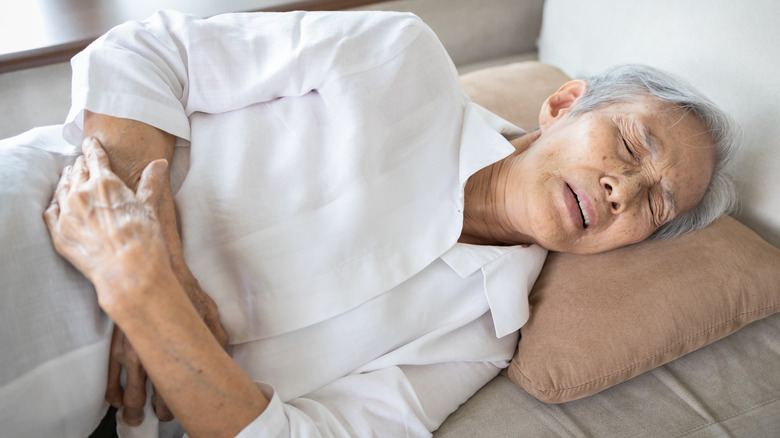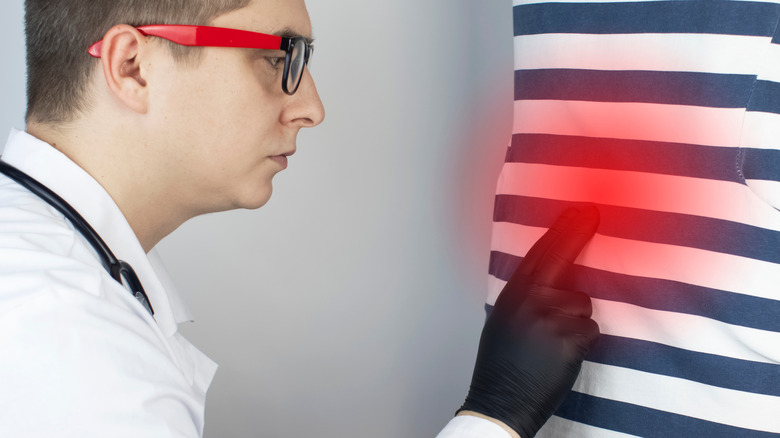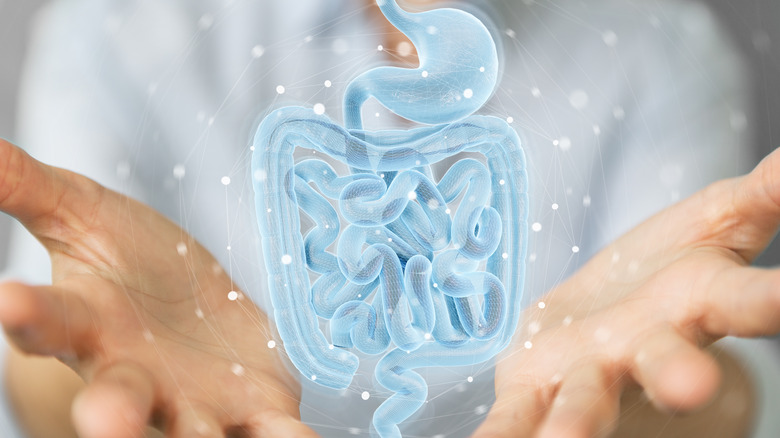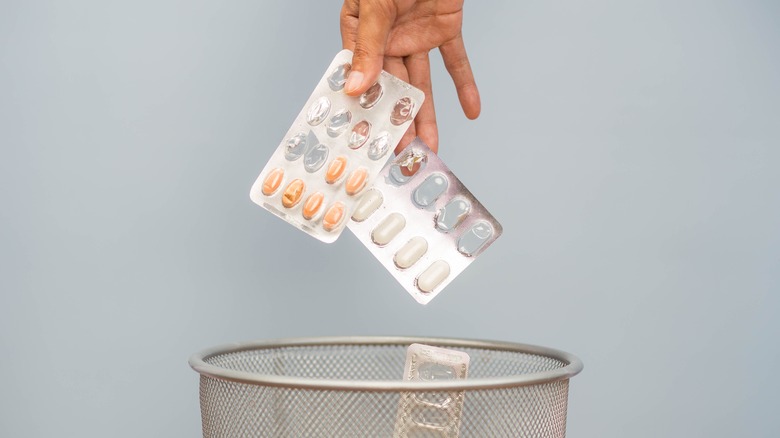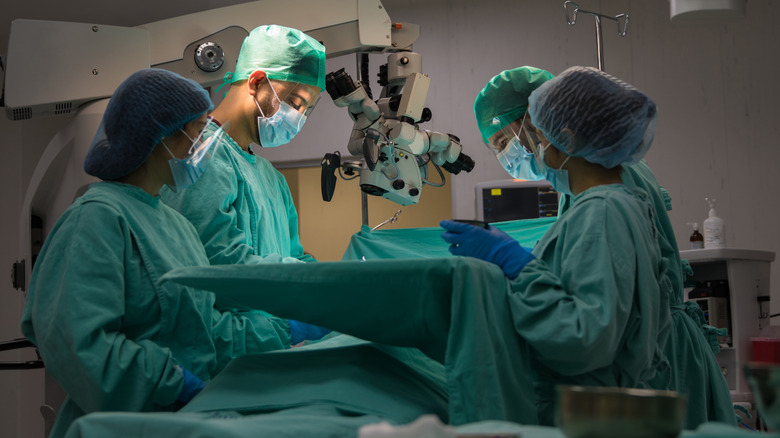Myths You Should Stop Believing About IBD
Inflammatory bowel disease (IBD) can be either ulcerative colitis or Crohn's disease, both of which are fairly uncommon conditions (per Ferring Pharmaceuticals). In the United States, a little over 1.5 million people are affected by IBD. However, this number keeps growing each year, with about 70,000 new cases in the U.S. diagnosed annually (via the Crohn's & Colitis Foundation of America). IBD can affect children as well, with an estimated 80,000 of U.S. kids suffering from the disease. And even though the number of deaths associated with IBD are relatively low, the complications brought by it can be crippling.
Being poorly equipped with proper, credible information about handling the condition can accelerate the effects from mild or moderate to severe, which can heavily affect a person's life. Add a couple of myths and misconceptions to the scarce information about the disease, and what you get is fatal misinformation that negatively impacts how you take precautions and work around the condition.
When it comes to IBD, separating fact from fiction is crucial for effective prevention, management, and recovery. Through this article, we'll help bust some of the most popular misconceptions about the disease.
Myth: IBD will make it hard to live a normal life
Some people believe that having IBD is a complete game changer, toward the worst of what life offers. From getting the symptoms to dealing with the disease and being able to work and have fun like others, it may seem to be extremely difficult to live a normal life. Fortunately, that's not the case.
WebMD lists a few noteworthy people with IBD who have had very successful careers. The list includes John F. Kennedy, the 35th U.S. president, and Shinzo Abe, Japan's former prime minister (who had ulcerative colitis). In a TV interview, Abe said that he "need[ed] to go to the lavatory 30 times a day." And although the condition initially gave him a hard time (which led to his resignation), he was eventually able to manage his condition well enough to continue being a public servant.
Other celebrities who didn't let IBD stop them include Gregory Itzin, Amy Brenneman, Darren Fletcher, Chuck Lorre, Rolf Benirschke, Casey Abrams, Sunny Anderson, Dan Reynolds, Steven Redgrave, and Fernando Pisani (per HealthCentral).
Myth: IBD is the same as irritable bowel syndrome (IBS)
There may be some similarities between them, but IBD and irritable bowel syndrome (IBS) are two different diseases. It's true that the two conditions affect the digestive system — specifically, the intestines, stomach, and esophagus (via Beth Israel Deaconess Medical Center). They also share some symptoms, like constipation, stomach pain, and feeling swollen due to holding in a lot of gas or fluid.
However, there are a few significant differences between the two. For starters, symptoms like eye, joint, and skin inflammation, decreased desire for food, fever, and black (or bloody) poop are common in IBD, but not in IBS (per WebMD). On the other hand, you are more likely to experience nausea and bloating due to gas with IBS than with IBD. IBS is also not as life-threatening as IBD, which increases your risk of getting colon cancer, colon holes, ulcers, loss of bones, and anemia. Moreover, while the exact factors that bring about IBS aren't really properly understood, the ones that cause IBD — which include extended digestive tract inflammation — are well known.
Crohn's & Colitis Foundation also mentions that IBD is a more serious disease than IBS, which is only a collection of symptoms. Also, with IBD, it can be easily observed as diagnostic imaging happens, which isn't the case for IBS.
Myth: IBD can be completely cured
You may have heard of some "effective," "well-researched," or "doctor-approved" cures for IBD somewhere online or through someone you know. There are plenty of health companies out there offering probiotics, health supplements and herbal solutions which they claim can cure IBD. What's worth noting about the condition is that while its symptoms can be easily treated, it doesn't go away entirely (via Healthline). Per Medical News Today, available treatment options for the disease include surgery (when medication fails to be effective, or when the condition becomes too severe), medication (like biologics, aminosalicylates, immunomodulators, corticosteroids), and lifestyle changes and activities (like yoga). However, none of these cure IBD.
Researchers and medical experts are still looking for new strategies and interventions, closely examining key factors like a person's environment, genetics, and inflammation levels. They are also studying the Mycobacterium avium paratuberculosis (MAP) bacteria — which brings about symptoms in a condition called Johne's disease that are strikingly similar to IBD's) and the gut microbiome (which seems to have indicators of the cause of the disease, as well as a potential cure).
Myth: Stress contributes directly to every case of IBD
Some people believe that stress has a direct effect on all IBD cases. Most see stress as a contributing factor to how much the disease affects you. In other words, the more you're stressed, the easier it becomes for you to get the condition. Per the Zane Cohen Centre for Digestive Diseases, ulcerative colitis and Crohn's disease were initially classified as psychosomatic illnesses triggered by mental and emotional factors like stress.
However, modern research has brought to light two types of IBD: one that's affected by stress, and one that's not. For the type that's easily influenced by stress, it may affect your overall quality of life and how you deal with the condition, as well as increasing the possibility of your symptoms worsening.
Stress has noticeable effects on how your intestines respond to stimulation, how easily other bodily substances can pass through your organs, cell movements, and even the changes that happen in your central nervous system (per a paper in Frontiers in Pediatrics). Those changes, which are triggered by stress and have a link to the signaling that happens between your central nervous system and gastrointestinal tract, are responsible for increasing symptom severity and the likelihood of relapses. However, this doesn't happen to all people with IBD — only the ones with the type that's stress-sensitive.
Myth: IBD's target is only the gut
Due to its name, IBD can be easily mistaken for a condition that acts solely on the stomach, intestines, and rectum. However, the condition can actually affect almost every organ system (via a paper in Gastroenterology & Hepatology).
The areas it's known to affect for the most part are the dermatologic system (your skin, nails, and hair) and musculoskeletal system (your tendons, bones, cartilage, connective tissues, and ligaments). Other body systems that IBD can affect are the ocular system (your eyes, lens, fluids, and cornea), respiratory system (the trachea, lungs, capillaries, the nasal cavity, air sacs, sinuses, mouth, bronchioles, throat, diaphragm, and voice box) and renal system (the urethra, kidneys, bladder, and ureters).
However, don't be surprised if you feel more inflammation in the liver, pancreas, and bile ducts (the hepatopancreatobiliary system) as well. Complications in this system linked to IBD include primary sclerosis cholangitis (chronic liver disease), hepatic abscess (mass in the liver that's full of puss), cholelithiasis (gallstone disease), portal vein thrombosis (a blood clot that blocks the portal vein), liver cirrhosis (extreme damage of liver with liver failure and scarring), pancreatitis (inflammation in the pancreas), and hepatosplenic lymphoma (linked to a biologic agent), per a review in the journal Inflammatory Bowel Disease.
Myth: IBD is closely connected to personality types
Decades ago, researchers expressed their concern about how people with certain personality types increased their likelihood of developing IBD. A 1989 study published in Gut aimed to understand the personalities and attitudes of people with IBD. The study worked with a total of 80 participants: 36 participants with ulcerative colitis and 44 with Crohn's disease, who were receiving inpatient and outpatient care. The participants reported no surgical treatments in the past. Their symptoms were assessed in the beginning and, as the study progressed, they were evaluated via a life assessment questionnaire (the Hospital Anxiety and Depression Scale, and the Eysenck Personality Inventory).
The results showed that most patients with IBD expressed introversion and neurotic behaviors. Per the findings, introversion increased as the condition developed, and depression accompanied those who had highly active inflamed bowels. However, the study also mentions that the evaluation of the patients had only been done before diagnosis, not before the disease began affecting them. This means that any mental and emotional changes that happened before that weren't taken into account.
Now, however, modern-day evidence and medical experts have disproven the notion that personality has any link whatsoever to the condition, which is why personality type isn't included among the risk factors for IBD (per Health).
Myth: Gluten-free foods can get rid of IBD permanently
You may have been led to believe that avoiding foods with gluten (like biscuits, flour, beer, cereal, baked products, and pasta) can help get rid of IBD for good. Unfortunately, while doing so may prove beneficial for folks with IBD (via a paper in Inflammatory Bowel Diseases), this measure isn't exactly a permanent cure.
Gluten is present in grains like barley, triticale, wheat, spelt, and rye, and consists of a collection of proteins (via Medical News Today). Per the American Chemical Society, these proteins include glutenin and gliadin. Foods with gluten can help protect us from toxic metals (e.g., cadmium, mercury, lead), reduce our risk of type 2 diabetes, heart disease, and colorectal cancer, and even prevent excessive caloric intake (per Mind Body Green). However, they may also bring about gut issues like abdominal pain, diarrhea, nausea, bloating, and fatigue. That's why eating gluten-free food goes a long way for people with IBD in terms of managing symptoms and minimizing flare-ups, but does not cure the condition completely.
With that said, if you're planning to go gluten-free, Medical News Today recommends incorporating fruits and vegetables (mostly frozen ones), rich sources of healthy fats (Greek yogurt and olive oil), carbs (sweet potatoes, butternut squash, quinoa, and brown rice), and proteins (fish, lentils, and chicken), and seeds and nuts into your diet.
Myth: You can get both ulcerative colitis and Crohn's all at once
Sometimes, people get confused about the types of IBD (ulcerative colitis and Crohn's disease) and end up thinking that they have both. The reality, though, is that it's possible to mistake one for the other, if you aren't aware of their differences.
In essence, these two conditions have several differences, but share a few things in common as well. For starters, both have the same effect on males and females. They also share a few risk factors, including genetics and environment. Moreover, they mostly occur in people who are in their teens, 20s, and early 30s, with symptoms that are quite similar (per UCLA Health).
As for their differences, WebMD points out that ulcerative colitis occurs in the colon, while Crohn's disease occurs throughout the digestive tract (and may manifest in your rectum, mouth, or any other parts in between). Secondly, ulcerative colitis presents evenly spread inflammation, while Crohn's disease leaves a few areas untouched. Thirdly, while more of the symptoms of ulcerative colitis are visible because of the areas it targets, with Crohn's disease, some symptoms may go unnoticed if they affect parts in the digestive tract that are hard for the doctor to reach. UCLA Health also mentions indeterminate colitis, another form of IBD that comes with symptoms of both ulcerative colitis and Crohn's disease, which often makes people think they have both conditions.
Myth: When symptoms disappear, medication is no longer necessary
Some people think that if they've been following their doctor's recommendations and they notice their symptoms slowly fading away, it's a sign to bring their medication routine to a screeching halt. Unfortunately, this false belief may cause your condition to become even more severe and lead to long-term damage.
According to WebMD, refraining from taking medication just because your symptoms have improved may lead to increased flare-ups, additional complications (e.g., a fast-growing swelling on your colon, a colon hole, or an irritable colon), more withdrawal symptoms (feebleness, exhaustion, body pains, nausea, and joint pain), heightened risk for cancer, and decreased medication effectiveness
When it comes to IBD remission (when the cause of inflammation is addressed), there are several types: clinical (when most of the nasty symptoms disappear), endoscopic (when your colon and rectum examinations give the green light), and histologic (where there's no noticeable inflammation in your test results). In all these types, medication and personal caution are always strongly recommended. This means you'll need to keep taking your remission medications, performing physical exercises, taking supplements, keeping stress to a minimum, and following your doctor's orders (via Medical News Today).
Myth: Surgery is a must when you have IBD
Some patients with certain health conditions may feel fear and apprehension at the mere mention of surgery, and patients with IBD are no exception. This is understandable, considering the risks that go hand in hand with surgery (e.g., the possibility of getting infected, tissue scarring, fistula, pouch lining inflammation), per Crohn's & Colitis UK. However, not everyone with IBD has to undergo surgery.
Per an article in the World Journal of Gastroenterology, about two in every 10 people who have ulcerative colitis and approximately eight in every 10 people with Crohn's disease undergo surgery. Crohn's & Colitis UK adds that over the course of a decade, about 15% of patients with ulcerative colitis find relief in surgery. For the most part, the instances when surgery becomes an appealing option include when you experience extreme symptoms and health issues like a colon hole (colon tear) and extreme diarrhea accompanied by bleeding, fever, and dehydration.
Also, when your symptoms don't improve after years of medication (or when there's a high risk of you getting bowel cancer), your doctor may ask you to undergo surgery. Some of the common types of surgery linked to IBD include proctocolectomy with ileostomy, laparoscopy, colectomy with ileostomy, and restorative proctocolectomy with ileo-anal pouch.
Myth: There are no helpful treatments that can ease the burden of IBD
Contrary to what some may believe, there are several effective treatment options for IBDs, with the high possibility of leading to remission.
According to the Mayo Clinic, some of the treatments available include anti-inflammatory medication (e.g., Dipentum, Colazal, Rowasa, and Delzicol), immune system regulators (e.g., Trexall, Azasan, Purinethol, and Purixan), antibiotics (Flagyl and Cipro), and biologics (e.g., Remicade, Humira, Simponi, and Skyrizi). You may also find pain relievers like Tylenol, anti-diarrhea drugs like Citrucel and Metamucil, or even supplements and vitamins as part of your prescription.
Other therapies that may also help reduce symptoms (via an article in the World Journal of Gastroenterology) include cognitive behavioral therapy (a therapist-patient team-up that helps recognize and resolve destructive thoughts and habits), mindfulness-based therapy (based on the practice of mindfulness), and psychodynamic psychotherapy (related to the conscious and unconscious mind, mixed with self-generated training).

